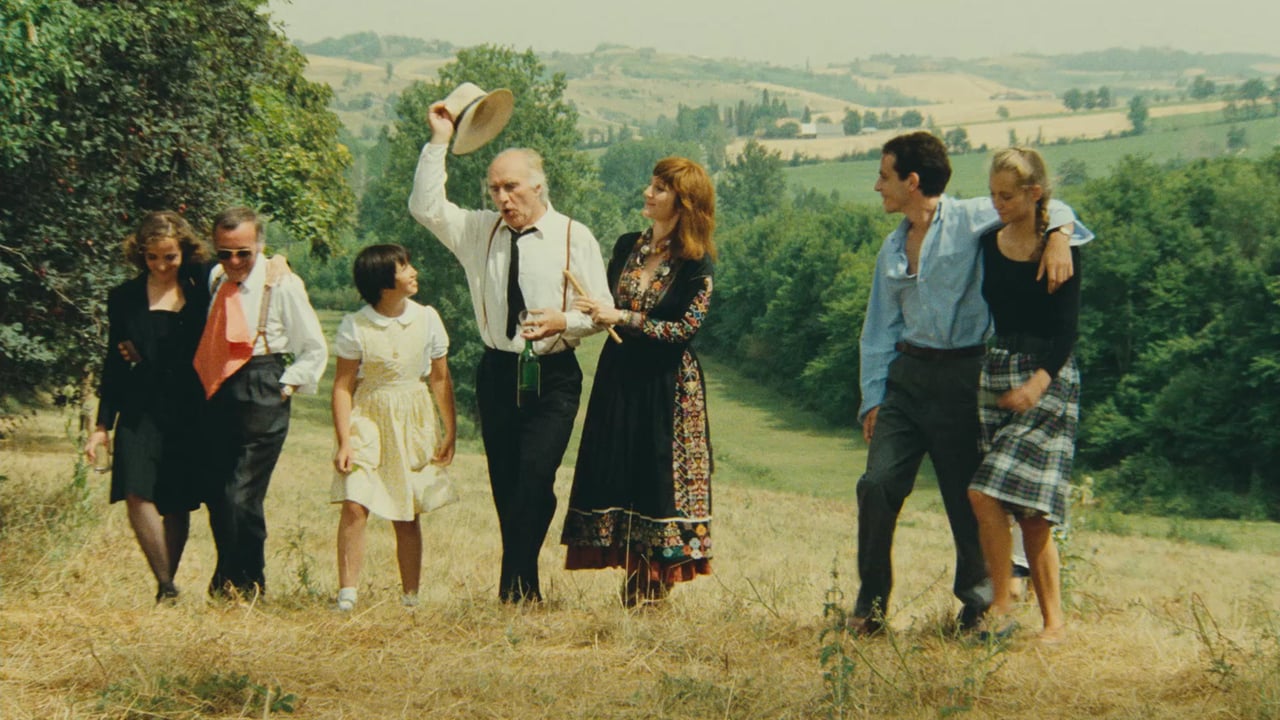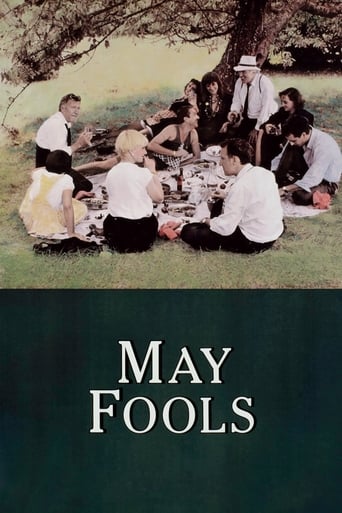



Wonderful character development!
The film makes a home in your brain and the only cure is to see it again.
View MoreThe movie really just wants to entertain people.
.Like the great film, it's made with a great deal of visible affection both in front of and behind the camera.
View MoreThis is a movie about the romantic awakening of an open-minded, freckle-faced ingénue named ... hold on, Milou turns out to be a gentle and wizened giant of a man, played by Michel Piccoli, who has apparently learned to live with an inappropriately cute nickname. He is living on his mother's country estate, and generally enjoying the decelerated life of landed gentry. Then his mother dies and his siblings descend on the mansion, threatening his casual existence (or maybe just questioning Milou's privilege of doing FA for a living). At the same time, the riots of 1968 are unfolding in far-away Paris.The small group represent the different attitudes of French society at the time, we have the idealistic student who is overly anxious to see the arrival of a new world order, alongside the bourgeois reactionary who is somewhat less enthusiastic about horde of bearded baba cools putting up barricades, a housemaid who just wants to get her share of the inheritance, as well as a woman who feels impelled to take her top off for some reason. At one point, the group flee into the woods, and return the next morning. Somehow, the biggest bourgeois of all, Milou, is untouched by the quarrels around him and ends up continuing to live his placid mansion life, seemingly because he is so quaint and affable.This movie had a few good ideas and moments, but it kind of runs out of ideas and plot after the family is assembled and their individual positions are established. In the end it's more or less a showcase for Michel Piccoli.
View MoreAs the story begins, an elderly woman is seen in her kitchen. Suddenly, something strikes her and she dies in front of our eyes. Milou, her oldest son, living in the estate, tries to notify the family that are scattered all over France. It is a difficult time for the country. May of 1969 marked a serious time for France as hordes of left wing individuals took to the streets in protest against one of the most beloved figures, General Charles DeGaulle. As the family pours in, the situation begins to turn ugly. Even in this peaceful corner in rural France, people are seen in the country lanes singing The International and carrying communist flags. The first to arrive is Camille, Milou's daughter. Married to a doctor, and with three children, her mind is on whatever can be sold to be divided among the heirs. Her love toward the dead grandmother is clearly not so strong.The other sibling, Georges, comes in with his English wife, Lily, a sensual woman, much younger than her husband. Claire, a niece by way of Georges and Milou, arrives with a female companion, showing obvious signs of being in a lesbian relationship. Claire's parents died in an automobile accident, leaving her to claim a third of whatever is made out of what the family decide to sell.Everyone is surprised when Daniel, the notary, comes to read the dead lady's will. Adele, the loyal servant, has been made a lawful heir, so the estate must be divided by four. Calculating Camille has taken care of stealing an emerald ring from her grandmother's jewelry chest without telling anyone. Claire is the only one that questions her cousin. Much bickering goes on as nothing is found to have great value, but the land and its vineyards might bring a decent prize, but Milou, having lived in the place all his life does not want to part with it. To complicate the situation, there is a problem with the burial of the dead lady. The grave diggers at the local cemetery are on strike, so the woman continues to be laid out at the house without no clear solution in mind. That problem does not interfere with some merrymaking from the family as they get giddy with drink. The arrival of a truck driver who could not continue his journey because of the barricades, and some scared neighbors, make the group abandon the house and go into the adjacent woods where all kinds of mishaps befall them until the political situation gets clear and everyone can go back to their lives, but leaving Milou alone in the house with his memories of happier times, and abandoned by the clan."May Fools" was one of Louis Malle's best films, yet it is seldom seen nowadays. With a screenplay by Jean Claude Carriere and the director, the film evokes "Uncle Vanya", a theme which Mr. Malle explored in his wonderful "Uncle Vanya on 42nd Street" on his last work for the screen. Against the turmoil in France during that fateful May, the creators work to create an atmosphere about a family in crisis, juxtaposing the action against the political situation reigning at the time. The idea of upcoming changes in France caused panic among the bourgeois family members, as it presented a menace to their way of life, as they knew it. The younger relatives took a different view, in contrast with what was expected of them.The great Michel Piccoli made a wonderful patriarch figure in his take of Milou. His work in the film was among the best things he was called to play. Milou was powerless in the machinations that were all around him. Miou Miou's Camille shows a callous woman who is only interested in her own welfare, not caring for the rest of the family. Dominique Blanc is excellent as Claire. The supporting cast impresses, especially Harriet Walker, Francois Berleand, Michael Duchaussoy, Bruno Carette, Martine Gautier and Paulette Dubost, who is the dead Mrs. Vieuzac throughout the film. Lovingly photographed by Renato Berta and with a jazzy musical score by Stephane Grappelli, "May Fools" is worth a look by serious fans of the Louis Malle.
View MoreMalle made only two films after this one, Damage, and Vanya On 42nd Street and it's tempting to view Milou en Mai as a rehearsal for Vanya though in the end the differences outweigh the similarities. It IS set on a country estate that is running to seed and there IS a 'Vanya' figure in Milou himself (Michel Piccoli) who more or less tends the estate in the absence of his siblings - one deceased, one pursuing his own career. There IS a family gathering with all that that implies, bickering, truth-telling, laughter, tears, accusations, recriminations etc. Perhaps above all it is a MOOD piece which does put it in the same universe as Chekhov but it is ultimately too easy to read it in this way. It was a masterstroke to place it at the time of the student riots in Paris, May, 1968 and this strengthens the links with Chekhov who, of course, wrote his own masterpieces at a time when Russia was undergoing changes unacknowledged by his gentlefolk with their heads in the metaphorical sand of dachas serenely remote from the turbulence. This is a film of great lyricism and melancholia with a gentle Jazz music score by Stephane Grappelly and the action, such as it is, is kick-started by the death of Milou's mother which necessitates summoning the family for the funeral. Again like Chekhov what we have here is an ensemble piece rather than Leading Man, Leading Lady, Juvenile, Ingenue, etc and the acting is uniformly excellent from Miou-Miou as Milou's daughter, Camille, to Francois Berleand as the family lawyer who drives a red Alfa Romeo and still carries a torch for Camille, to Valerie Lemercier in the small but telling role of Madame Boutelleau. The events in far-off Paris punctuate but are not allowed to dominate and barely to influence the action leaving the family - and non-family - to quarrel, couple, fail-to-couple and relate the occasional home truth. In short a lovely Autumnal movie.
View MoreMilou en Mai finds the aging Louis Malle at his most wickedly wistful, directing mischievous set pieces and ultimately expressing nervous laughter at his own mortality. Made more in the traditions of British farce than the traditional French 'sophistication', in being set to the background of the 60's union unrest and student riots, the film keeps a subtle check on the ridiculous. Examining death, family relationships, marital relationships, extra-marital relationships and the different ways people perceive their lot in life, Milou en Mai has something for everyone: farcical comedy, beautiful cinematography, perceptive commentary, delightful anecdotes (I'm thinking of the opening bee-keeper scene and crab-catching in the river) and fantastic 'Hot Club de France' bowing and strumming. This film is one of my all time favourites - gentle, intelligent, sensitive fun - highly recommended.
View More